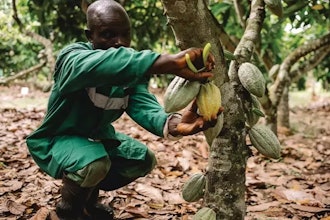PORTLAND, Maine (AP) — Maine's wild blueberry growers are expecting their biggest crop in more than a decade.
This year's crop is projected to come in between 90 million to 95 million pounds, with the monthlong harvest kicking into gear the first week of August. If the yield reaches 90 million pounds, it would be the largest harvest since 2000, when production reached a record 110 million pounds.
Maine's blueberry crop has averaged from 80 million to 85 million pounds a year the past five years, said David Yarborough, blueberry specialist for the University of Maine Cooperative Extension.
"This year we're maybe looking at another 10 million pounds, perhaps 90 to 95 million," he said. "It's contingent upon weather conditions between now and the end of August. If we have a drought it won't hold true, but if we have a lot of rain it could exceed that."
August typically marks the beginning of the blueberry harvest in Maine, which is the No. 1 wild blueberry state by far, with 60,000 acres of fields.
Wild blueberries grow naturally in Maine and eastern Canada and are different from cultivated berries, which are larger and grow on high bushes. Cultivated blueberries are commercially grown in about 10 states.
A small amount of Maine's crop is sold fresh, but 99 percent is processed, making its way into blueberry muffins, cereal, yogurt and other food products.
Growers in 2011 averaged nearly 91 cents a pound for their harvest, up from 61 cents in 2010 and 36 cents in 2009, according to the National Agricultural Statistics Service. Last year's harvest was worth $75 million.
The price is holding up for wild blueberries because of what's happening with cultivated berries.
The crop in Midwest has been hurt by hot, dry weather, said Ed Flanagan, president and CEO of Jasper Wyman & Son, a wild blueberry company based in Milbridge. There's also been strong demand for fresh cultivated blueberries, meaning the supply going to the processed market isn't as large as anticipated, thereby creating more demand among processors for wild blueberries.
Prices in Maine should remain strong, but probably won't be as high as last year, Flanagan said.
"Depending on what side of the buyer-seller desk you're on, it looks like it'll probably be another pretty good year for blueberry sellers," he said.
The higher prices for growers could result in higher prices for food manufacturers and consumers.
If prices go too high, food processing companies could turn to other ingredients for their end products, said Yarborough. It wouldn't be unheard of for jam makers in Japan to stop making blueberry jam altogether if the price is too high, he said.
Food manufacturers might absorb the costs if the higher prices are short-term, but eventually they'll have to pass them on to consumers, he said.
"If the berries are higher and that's a significant part of the product, then consumers will pay more for it," he said.
Growers don't want the prices to go too high, Flanagan said.
"If the price of blueberries gets too high, then the product development departments, let's say it's a muffin baker, they'll start putting more chocolate chip muffins on the shelf rather than blueberry muffins," he said. "We really need to be mindful of that."






















